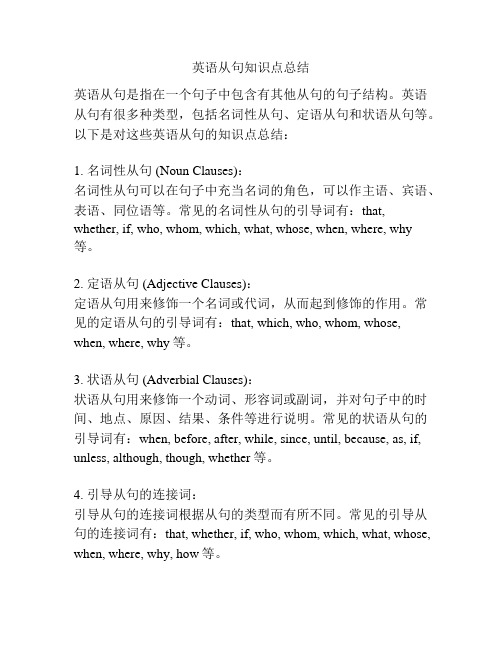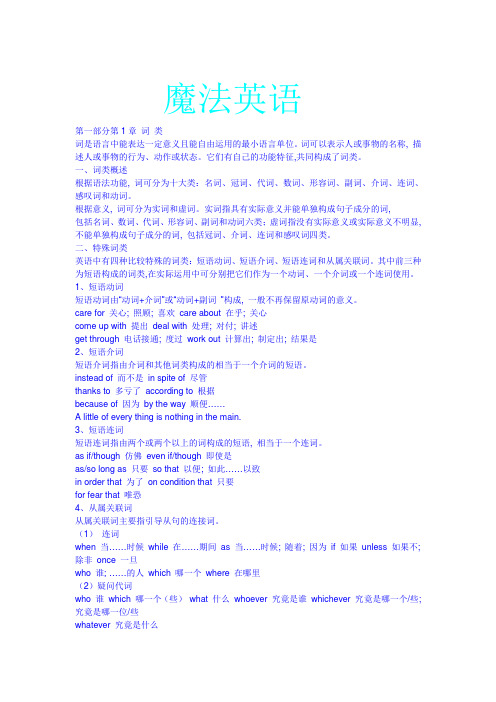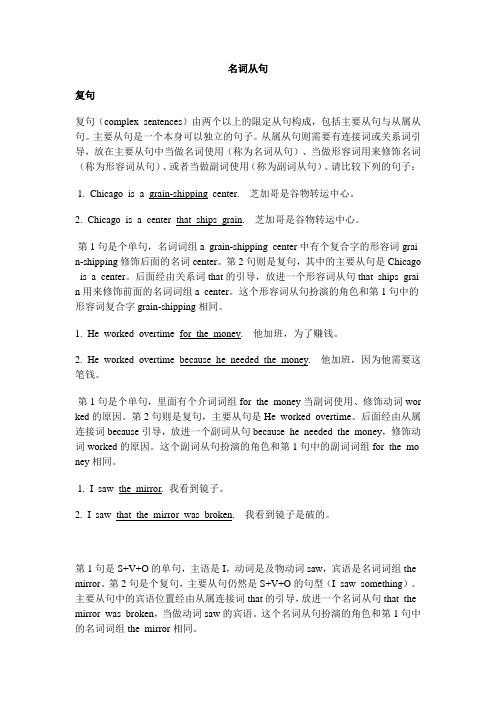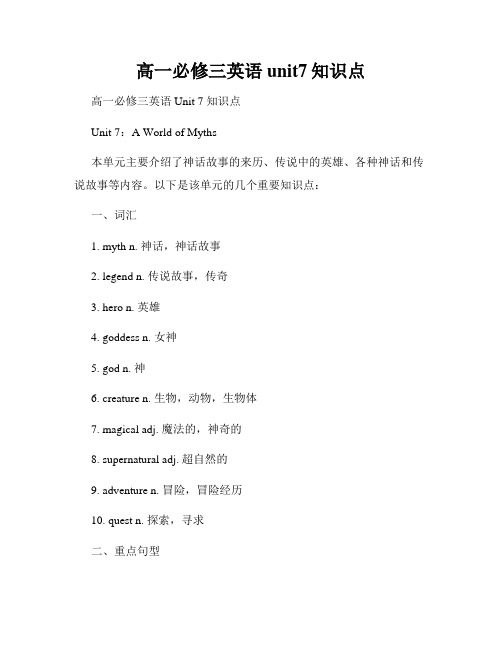魔法英语 名词从句
英语从句知识点总结

英语从句知识点总结英语从句是指在一个句子中包含有其他从句的句子结构。
英语从句有很多种类型,包括名词性从句、定语从句和状语从句等。
以下是对这些英语从句的知识点总结:1. 名词性从句 (Noun Clauses):名词性从句可以在句子中充当名词的角色,可以作主语、宾语、表语、同位语等。
常见的名词性从句的引导词有:that, whether, if, who, whom, which, what, whose, when, where, why等。
2. 定语从句 (Adjective Clauses):定语从句用来修饰一个名词或代词,从而起到修饰的作用。
常见的定语从句的引导词有:that, which, who, whom, whose, when, where, why等。
3. 状语从句 (Adverbial Clauses):状语从句用来修饰一个动词、形容词或副词,并对句子中的时间、地点、原因、结果、条件等进行说明。
常见的状语从句的引导词有:when, before, after, while, since, until, because, as, if, unless, although, though, whether等。
4. 引导从句的连接词:引导从句的连接词根据从句的类型而有所不同。
常见的引导从句的连接词有:that, whether, if, who, whom, which, what, whose, when, where, why, how等。
5. 从句的位置:从句可以出现在主句前面、中间或后面,具体的位置取决于从句的类型和句子的结构。
6. 省略从句的连接词:在某些情况下,从句的连接词可以省略,只保留从句的其他成分,例如主语、谓语等。
7. 从句的语序:从句的语序与主句的语序有所不同。
在陈述语序中,从句的语序和主句的语序一致;而在疑问语序中,从句的语序要倒装。
以上是英语从句的一些基本知识点总结。
名词性从句英语语法知识点汇总

名词性从句英语语法知识点汇总名词性从句是在句子中起名词作用的句子。
名词性从句的功能相当于名词词组,它在复合句中能担任主语、宾语、表语、同位语、介词宾语等。
下面就是小编给大家带来的名词性从句英语语法知识点汇总,希望大家喜欢!1 引导名词性从句的连接词引导名词性从句的连接词可分为三类:连接词:that,whether,if 不充当从句的任何成分)连接代词:what, whatever, who, whoever, whom,whose, which.连接副词:when, where, how, why不可省略的连词:1. 介词后的连词2. 引导主语从句和同位语从句的连词不可省略。
That she was chosen made us very happy.We heard the news that our team had won.比较:whether与if 均为"是否"的意思。
但在下列情况下,whether 不能被if 取代:1. whether引导主语从句并在句首2. 引导表语从句3. whether从句作介词宾语4. 从句后有"or not"Whether he will come is not clear.大部分连接词引导的主语从句都可以置于句末,用it充当形式主语。
It is not important who will go.It is still unknown which team will win the match.2 名词性that-从句1)由从属连词that引导的从句叫做名词性that-从句。
That只起连接主句和从句的作用,在从句中不担任任何成分,本身也没有词义。
名词性that-从句在句中能充当主语、宾语、表语、同位语和形容词宾语,例如:主语:That he is still alive is sheer luck. 他还活着全靠运气。
魔法英语语法第十四章强调

--We will sail out to the island. 我们将出海远航,前往该岛。
②副词up 经常与go ,run, walk, come等动词连用,由远及近地"从某处来","到某处去"。
A stranger came to me and asked the way. 一个陌生人向我走来问路。
--பைடு நூலகம்Whenever did you find time to do it 你究竟什么时候有空做这事?
Where are you going 你到哪里去?
-- Wherever are you going 你究竟到哪里去?
Who can that be 那会是谁呢?
Whoever can that be 那究竟会是谁呢??
Never will China be the first to use nuclear weapons. 中国决不会第一个使用核武器。
Across the river lies a newly-built bridge. 河上有一座新建的桥。
Hero as he is, he still remains modest. 尽管他是英雄,他仍然很谦虚。
-- A stranger came up to me and asked the way. 一个陌生人走到我跟前来问路。
Please bring the things to my office. 请把这些东西拿到我办公室来。
名词性从句英语语法知识点归纳

名词性从句英语语法知识点归纳名词性从句英语语法知识点归纳名词性从句相当于名词,可分别作主句的主语、表语、宾语和同位语。
因此,名词性从句可分为主语从句、表语从句、宾语从句和同位从句。
一、引导名词性从句的连接词1. 连接代词:who, whose, whom, what, which.有词义,在从句中担任成分,如主语、表语、宾语、或定语等。
2. 连接副词:when, where, why, how.有词义,在从句中担任成分,作状语。
3. 连接词:that, whether, if, as if.that 无词义,在从句中不担任成分,有时可省略;if (whether),as if虽有词义,但在从句中不担任成分。
注意:连接代词与连接副词在句中不再是疑问句,因而从句中谓语不用疑问式。
连接代词与连接副词在从句充当句子成分,连接词whether 和if(是否),as if(好像)在从句中不充当句子成分,只起连接作用。
根据句义,如果连接代词与连接副词,whether、if 和as if 都用不上时,才用that作连接词(that本身无任何含义)。
二、主语从句1. 主语从句在复合句作主语。
e.g. Who will go is not important.2. 用it作形式主语,主语从句放在句末。
e.g. It doesn‘t matter so much whether you will come or not.3. that引导主语从句时,不能省略。
e.g. That he suddenly fell ill last week made us surprised.三、表语从句1. 表语从句在复合句中作表语,位于系动词之后。
e.g. The question was who could go there.2. 引导表语从句的连接词that有时可省去。
e.g. My idea is (that) we can get more comrades to help in the work.四、宾语从句1. 宾语从句在复合句中作宾语。
魔法英语

魔法英语第一部分第1章词类词是语言中能表达一定意义且能自由运用的最小语言单位。
词可以表示人或事物的名称, 描述人或事物的行为、动作或状态。
它们有自己的功能特征,共同构成了词类。
一、词类概述根据语法功能, 词可分为十大类:名词、冠词、代词、数词、形容词、副词、介词、连词、感叹词和动词。
根据意义, 词可分为实词和虚词。
实词指具有实际意义并能单独构成句子成分的词,包括名词、数词、代词、形容词、副词和动词六类;虚词指没有实际意义或实际意义不明显, 不能单独构成句子成分的词, 包括冠词、介词、连词和感叹词四类。
二、特殊词类英语中有四种比较特殊的词类:短语动词、短语介词、短语连词和从属关联词。
其中前三种为短语构成的词类,在实际运用中可分别把它们作为一个动词、一个介词或一个连词使用。
1、短语动词短语动词由“动词+介词”或“动词+副词”构成, 一般不再保留原动词的意义。
care for 关心; 照顾; 喜欢care about 在乎; 关心come up with 提出deal with 处理; 对付; 讲述get through 电话接通; 度过work out 计算出; 制定出; 结果是2、短语介词短语介词指由介词和其他词类构成的相当于一个介词的短语。
instead of 而不是in spite of 尽管thanks to 多亏了according to 根据because of 因为by the way 顺便……A little of every thing is nothing in the main.3、短语连词短语连词指由两个或两个以上的词构成的短语, 相当于一个连词。
as if/though 仿佛even if/though 即使是as/so long as 只要so that 以便; 如此……以致in order that 为了on condition that 只要for fear that 唯恐4、从属关联词从属关联词主要指引导从句的连接词。
英语名词从句 英语语法学习

名词从句复句复句(complex sentences)由两个以上的限定从句构成,包括主要从句与从属从句。
主要从句是一个本身可以独立的句子。
从属从句则需要有连接词或关系词引导,放在主要从句中当做名词使用(称为名词从句)、当做形容词用来修饰名词(称为形容词从句)、或者当做副词使用(称为副词从句)。
请比较下列的句子:1. Chicago is a grain-shipping center. 芝加哥是谷物转运中心。
2. Chicago is a center that ships grain. 芝加哥是谷物转运中心。
第1句是个单句,名词词组a grain-shipping center中有个复合字的形容词grai n-shipping修饰后面的名词center。
第2句则是复句,其中的主要从句是Chicago is a center。
后面经由关系词that的引导,放进一个形容词从句that ships grai n用来修饰前面的名词词组a center。
这个形容词从句扮演的角色和第1句中的形容词复合字grain-shipping相同。
1. He worked overtime for the money. 他加班,为了赚钱。
2. He worked overtime because he needed the money. 他加班,因为他需要这笔钱。
第1句是个单句,里面有个介词词组for the money当副词使用、修饰动词wor ked的原因。
第2句则是复句,主要从句是He worked overtime。
后面经由从属连接词because引导,放进一个副词从句because he needed the money,修饰动词worked的原因。
这个副词从句扮演的角色和第1句中的副词词组for the mo ney相同。
1. I saw the mirror. 我看到镜子。
2. I saw that the mirror was broken. 我看到镜子是破的。
高中英语名词性从句的知识点分析

高中英语名词性从句的知识点分析在句子中起名词作用的句子叫名词性从句 Noun Clauses。
名词性从句的功能相当于名词词组, 它在复合句中能担任主语、宾语、表语、同位语、介词宾语等,因此根据它在句中不同的语法功能,名词性从句又可分别称为主语从句、宾语从句、表语从句和同位语从句。
引导名词性从句的连词可分为三类:①that不充当从句的任何成分,无词义。
只起连接作用,因此往往可以省略。
whether, if不充当从句的任何成分,均表示“是否”表明从句内容的不确定性。
不可以省略。
as if,as though均表示“好像”,“似乎”②what, whatever, who, whoever, whom, whose, which③when, where, how, whyWho cleaned the blackboard is not known yet.谁擦的黑板还不知道。
What he said is not true.他说的不是实话That he’ll come to see us is really great.他来看我们真是太好啦。
I don’t know why he is absent.我不知道为什么他不在。
The question is whether he will join us next time.问题是下次他是否跟我们一起干。
It looks as if it is going to rain. 看上去天要下雨了。
1.主语从句①由从属连词引导的主语从句:Whether the country should build a nuclear power station is something we must discuss.那个国家是否应该建立核电站……That light travels in straight line is known to all .光以直线传播②由连接代词引导的主语从句:What we need is more time. 我们所需要的是……Whichever book you choose doesn’t matter to me.无论你选哪本书……Whoever comes will be welcome.无论谁来……③由连接副词引导的主语从句:When the plane is to take off hasn’t been announced.飞机什么时候起飞……Where he has been is still a puzzle.他到过哪儿……How much water is flowing can be measured easily.水的流量是多少……④关于形式主语 it▲It + be +形容词+ that-从句It is necessary that… 有必要……It is important that…重要的是……It is obvious that…很明显……It is likely that….很可能▲It + be + -ed 分词+ that-从句It is believed that…人们相信……It is known to all that…众所周知……注意该句型的变式:It is known to all that the earth goes around thesun.=As is known to all,the earth goes around the sun.=What is known to all is that the earth goes around the sun.It has been decided that…已决定……▲It + be +名词+ that-从句It is common knowledge that… ……是常识It is a surprise that…令人惊奇的是……It is a fact that…事实是……可应用于此句型的名词还有fact / shame / honor / question/pity等。
高一必修三英语unit7知识点

高一必修三英语unit7知识点高一必修三英语Unit 7 知识点Unit 7:A World of Myths本单元主要介绍了神话故事的来历、传说中的英雄、各种神话和传说故事等内容。
以下是该单元的几个重要知识点:一、词汇1. myth n. 神话,神话故事2. legend n. 传说故事,传奇3. hero n. 英雄4. goddess n. 女神5. god n. 神6. creature n. 生物,动物,生物体7. magical adj. 魔法的,神奇的8. supernatural adj. 超自然的9. adventure n. 冒险,冒险经历10. quest n. 探索,寻求二、重点句型1. In Greek mythology, Zeus was the king of all the gods. (在希腊神话中,宙斯是所有神的国王。
)2. She had to complete many tasks during her journey. (她在旅途中不得不完成许多任务。
)3. According to legend, the creature could fly and breathe fire. (根据传说,这个生物能飞翔并喷火。
)4. This story has been passed down from generation to generation. (这个故事一代一代地传承下来。
)5. His bravery and determination won him the love and respect of the people. (他的勇敢和决心赢得了人们的爱和尊重。
)三、文化背景1. Greek mythology(希腊神话)希腊神话是古希腊文化中非常重要的一部分,其中包括了众多故事、神明和英雄人物等。
宙斯是最有权势的神,被认为是所有众神之王。
这些神话不仅影响了希腊人的生活和文化,也对全世界的艺术、文学和思想产生了深远的影响。
- 1、下载文档前请自行甄别文档内容的完整性,平台不提供额外的编辑、内容补充、找答案等附加服务。
- 2、"仅部分预览"的文档,不可在线预览部分如存在完整性等问题,可反馈申请退款(可完整预览的文档不适用该条件!)。
- 3、如文档侵犯您的权益,请联系客服反馈,我们会尽快为您处理(人工客服工作时间:9:00-18:30)。
魔法英语语法:第九章名词性从句[ 2007-10-29 15:17:00 | By: lily ] 由一个主句和一个或一个以上的从句构成的句子叫复合句。
名词性从句在复合句中起名词的作用,它包括主语从句、宾语从句、表语从句、同位语从句四大类,在句中分别用作主语、宾语、表语和同位语。
一、引导名词性从句的关联词A.that连词that本身没有意义,在从句中不担任任何句子成分,在宾语从句中有时可省略。
I hear (that) he has joined the football club. 我听说他已经加入了足球俱乐部。
That light travels in straight line is known to all. 众所周知,光是以直线传播的。
It so happens that I know the man. 碰巧我认识那个。
Is it certain that they will win 他们一定会赢吗B.whether和if连词whether和if本身有意义(解释是否),在从句中不可省略。
1.whether可以连接所有的名词性从句,而if只能引导宾语从句。
I didn't know whether he would attend the concert. 我并不知道他是否参加音乐会。
(宾语从句,可用if代替whether)The question is whether it s worth trying. 问题是值不值得试一试。
(表语从句,不可用if代替whether)Whether she comes or not makes no difference. 她来不来都没有关系。
(主语从句,不可用if代替whether)He must answer the question whether he agrees to it or not. 他必须回答他是否同意此事这样一个问题。
(同位语从句,不可用if代替whether)2.whether引导的宾语从句可作介的宾语,而if则不能。
It all depends on whether they will support us. 这完全取决于他们是否支持我们。
(不用if)Ryan was worrying about whether he had hurt her feelings. 瑞恩担心是否伤害了她的感情。
3.if既可引导语从句,也可引导宾语从句。
如果用if会引起歧义,应避免使用if,而用whether。
Please let me know if you want to join us. 请告诉我你是否想加入我们。
(if引导的从句可被看成是宾语从句,if表示是否)Please let me know if you want to join us. 如果你想加入我们的话,请告诉我一声。
(if引导的从句可被看成是条件状语从句,if表示如果)Please let me know whether you want t join us. 请告诉我你是否想加入我们。
(为避免引起歧义,可用whether表示是否)C.who, whom, whose, what, which连接代词who, whom, whose, what, which等在从句中既起连接作用,同时又担当主语、宾语、定语、表语等成分。
No one knows who he was waiting for. 没人知道他当时在等谁。
We are worrying about what we should do next. 我们正在为下一步该怎么办而烦恼。
Tell me whos house it is. 告诉我这是谁的家。
Let me know which train you will be arriving on. 告诉我你将乘哪列火车到达。
D.where, when, how, why连接副词where, when, how, why等在从句中既是连接词,又作状语。
I don't know where we are going to have the meeting.我不知道我们将在哪儿开会。
She always thinks of how shecan work well. 她总是在想怎样能把工作做好。
What I am anxious to know is when we can visit the museum. 我急于知道我们什么时候能参观博物馆。
比较:when引导的时间状语从句和名词性从句中的不同时态。
Please lt me know when you arrive. 你到的时候,请告诉我一声。
(when 引导的是时间状语从句,从句中用一般现在时来表示将来。
)Please let me know when you will arrive. 请告诉我你什么时候到。
(whe n引导的是宾语从句,从句中用一般将来时。
)E.whoever, whomever, whatever, whichever, whosever连接代词whoever = anyone who任何人, 无论谁;whatever =anything th at凡是...,无论什么;whichever = anything that无论那一个, 任何一个;who mever = anyone whom (whoever的宾格形式)。
Whoever comes to the club is welcome. 不论谁来参加这个俱乐部都欢迎。
Whatever is worth doing at all is worth doing well.凡是值得做的就值得做好。
They ate whatever they could find o the deserted island. 他们在荒岛找到什么就吃什么。
You may do whatever you will. 你可做任何你想做的事。
I'll take whichever book interests me.我愿买任何让我感兴趣的书。
Whosever book is overdue will be fined. 不管谁的书过期未还都要被罚款。
比较:连接代词whoever在宾语从句中作主语,whomever作宾语从句中宾语。
You may offer he book to whoever wants it. 你可把这本书给任何想要的人。
(此句中不能使用whomever,因为whoever在宾语从句中作wants it的主语)You may offer the book to whomever you like.你可把这本书给任何你喜欢的人。
(whomever在宾语从句中作you like的宾语)二、宾语从句在复合句中用作动词宾语或介词宾语的从句叫宾语从句。
A. 作动词宾语He told us(that)he felt ill. 他对我们说他感到不舒服。
Do you know whose dictionary it is 你知道这是谁的字典?He has informed me when they are to discuss the work plan. 他已经通知我他们将什么时候讨论工作计划Give a reading list to whoever comes. 给所有来的人一份阅读书目。
注意:doubt(怀疑)的肯定句接ifwhether引导的宾语从句,但否定句和疑问句接t hat引导的宾语从句。
I doubt whether if he will succeed. 我怀疑他是否会成功。
I do not doubt that he can recite the poem. 我相信他能把这首诗背下来。
Do you doubt that he will win 你不相信会获胜吗B.作介词的宾语He was deeply displeased by what had occurred that day. 他对那天发生的事感到很不快。
I am curious as to what he will say. 我很想知道他要说什么。
Your success will largely depend upon what you do and how you do i t. 你是否成功将主要取决于你做什么和怎样做。
They were praised or criticizd according to how they had done their w ork. 他们受表扬还是受批评是根据他们工作好坏而定。
He goes to the library every day except when it is raining. 除了天下雨外,他每天都去图书馆。
注意:that引导的宾语从句只用在少数介词后,如:except, in, but等。
此时,that 不能省略。
I know little about him except that he lives downstais. 我对他知之甚少,只知道他住在楼下。
He differed from his classmates in that he devoted his spare time to r eading. 他和他的同学们不同的地方在于他把业余时间用在阅读上。
C. 作形容词的宾语I am not sure what I ought to do. 我不能确定我该做什么。
I'm afraid (that) you don't understand what I said. 恐怕你没领会我说的意思。
I'm suprised (that) I didn't see all that before. 我好奇怪,我以前没见过那一切。
D. 用it作形式宾语的情况1.和it作形式主语一样,我们常用it来作形式宾语,把真正的宾语从句放在句末,这种情况尤其出现在带复合宾语的句子中。
We thought it strange that Xiao Wang did not come yesterday. 我们认为小王昨天没来是奇怪的。
He has made it clear that he will not give n. 他已表明他不会屈服。
2.由于that引导的宾语从句一般不可以直接作介词的宾语,因此当介词后面需要用that从句作宾语时,必须使用it作形式宾语。
You may depend on it that I shall always support you. 你可以放心我会永远支持你的。
